International Finance Assignment 2: Risk Management
VerifiedAdded on 2020/03/13
|11
|2813
|98
Homework Assignment
AI Summary
This assignment delves into several key areas of international finance and risk management. It begins by explaining the interest rate parity theory and its implications for investment returns in different countries, using Argentina and the UK as examples. The assignment then explores the risks and opportunities for a UK-based firm expanding into Argentina, including foreign exchange, credit, and political risks. It further discusses the use of derivatives like forward and option contracts to hedge against foreign exchange losses. The solution includes a detailed example of triangular arbitrage and its profit potential, followed by an analysis of the relationship between forward exchange rates and purchasing power parity. The assignment also examines the use of call and put options in hedging currency risk, using a collar strategy. Finally, the assignment concludes with a discussion of the efficient market hypothesis, its critiques, and the impact of Brexit on the pound sterling and FTSE 100. The solution also touches upon the ethical issues related to the Transatlantic Trade and Investment Partnership (TTIP) and different types of hedging.
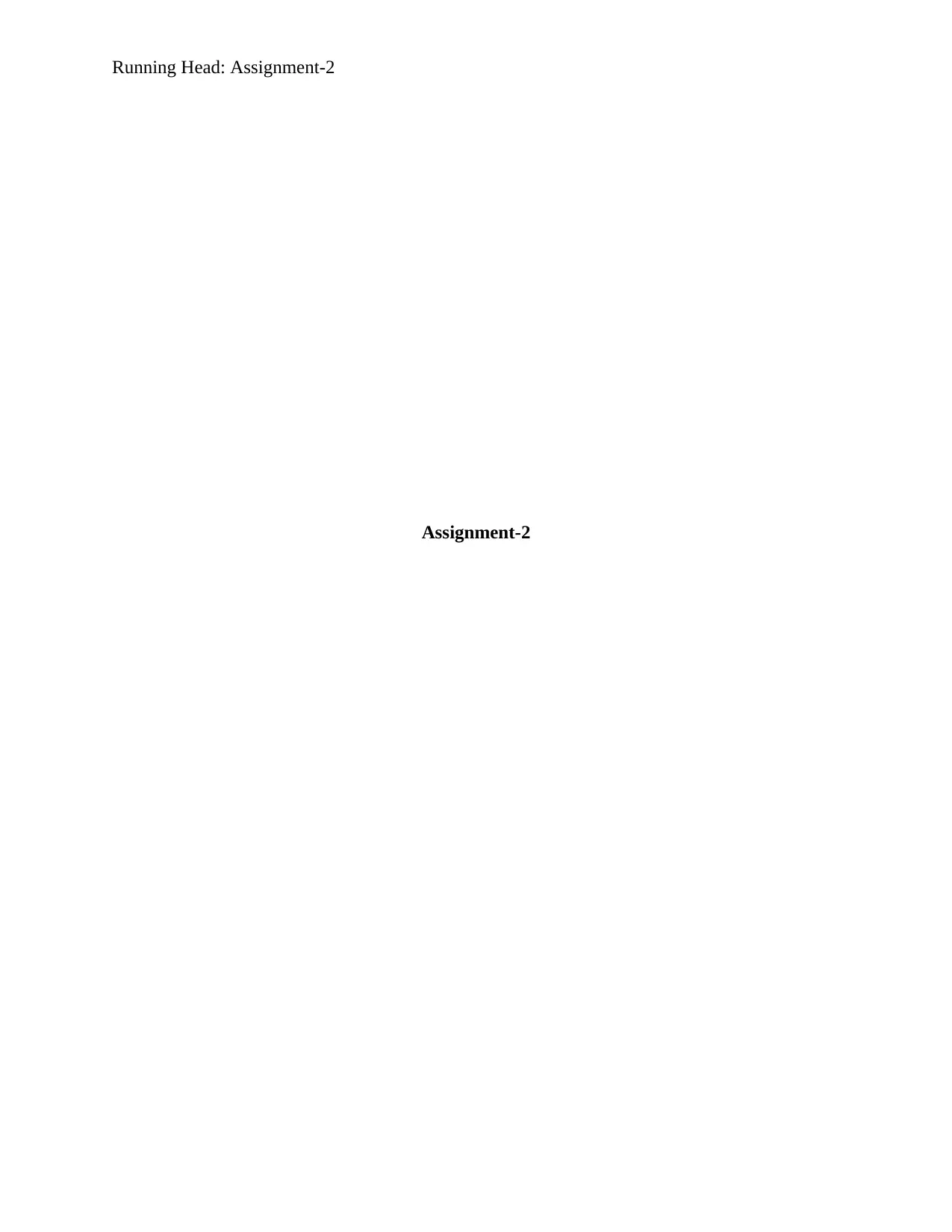
Running Head: Assignment-2
Assignment-2
Assignment-2
Paraphrase This Document
Need a fresh take? Get an instant paraphrase of this document with our AI Paraphraser
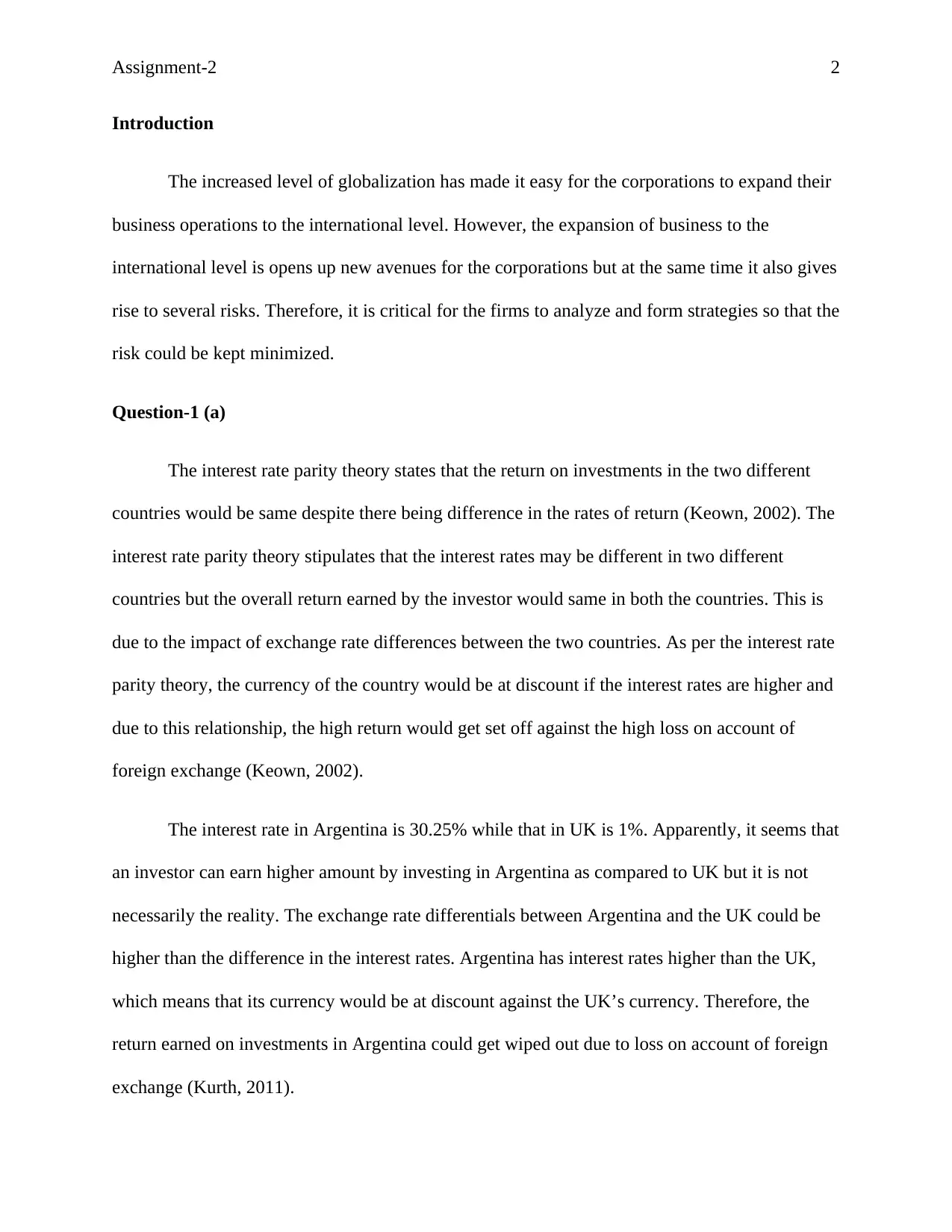
Assignment-2 2
Introduction
The increased level of globalization has made it easy for the corporations to expand their
business operations to the international level. However, the expansion of business to the
international level is opens up new avenues for the corporations but at the same time it also gives
rise to several risks. Therefore, it is critical for the firms to analyze and form strategies so that the
risk could be kept minimized.
Question-1 (a)
The interest rate parity theory states that the return on investments in the two different
countries would be same despite there being difference in the rates of return (Keown, 2002). The
interest rate parity theory stipulates that the interest rates may be different in two different
countries but the overall return earned by the investor would same in both the countries. This is
due to the impact of exchange rate differences between the two countries. As per the interest rate
parity theory, the currency of the country would be at discount if the interest rates are higher and
due to this relationship, the high return would get set off against the high loss on account of
foreign exchange (Keown, 2002).
The interest rate in Argentina is 30.25% while that in UK is 1%. Apparently, it seems that
an investor can earn higher amount by investing in Argentina as compared to UK but it is not
necessarily the reality. The exchange rate differentials between Argentina and the UK could be
higher than the difference in the interest rates. Argentina has interest rates higher than the UK,
which means that its currency would be at discount against the UK’s currency. Therefore, the
return earned on investments in Argentina could get wiped out due to loss on account of foreign
exchange (Kurth, 2011).
Introduction
The increased level of globalization has made it easy for the corporations to expand their
business operations to the international level. However, the expansion of business to the
international level is opens up new avenues for the corporations but at the same time it also gives
rise to several risks. Therefore, it is critical for the firms to analyze and form strategies so that the
risk could be kept minimized.
Question-1 (a)
The interest rate parity theory states that the return on investments in the two different
countries would be same despite there being difference in the rates of return (Keown, 2002). The
interest rate parity theory stipulates that the interest rates may be different in two different
countries but the overall return earned by the investor would same in both the countries. This is
due to the impact of exchange rate differences between the two countries. As per the interest rate
parity theory, the currency of the country would be at discount if the interest rates are higher and
due to this relationship, the high return would get set off against the high loss on account of
foreign exchange (Keown, 2002).
The interest rate in Argentina is 30.25% while that in UK is 1%. Apparently, it seems that
an investor can earn higher amount by investing in Argentina as compared to UK but it is not
necessarily the reality. The exchange rate differentials between Argentina and the UK could be
higher than the difference in the interest rates. Argentina has interest rates higher than the UK,
which means that its currency would be at discount against the UK’s currency. Therefore, the
return earned on investments in Argentina could get wiped out due to loss on account of foreign
exchange (Kurth, 2011).
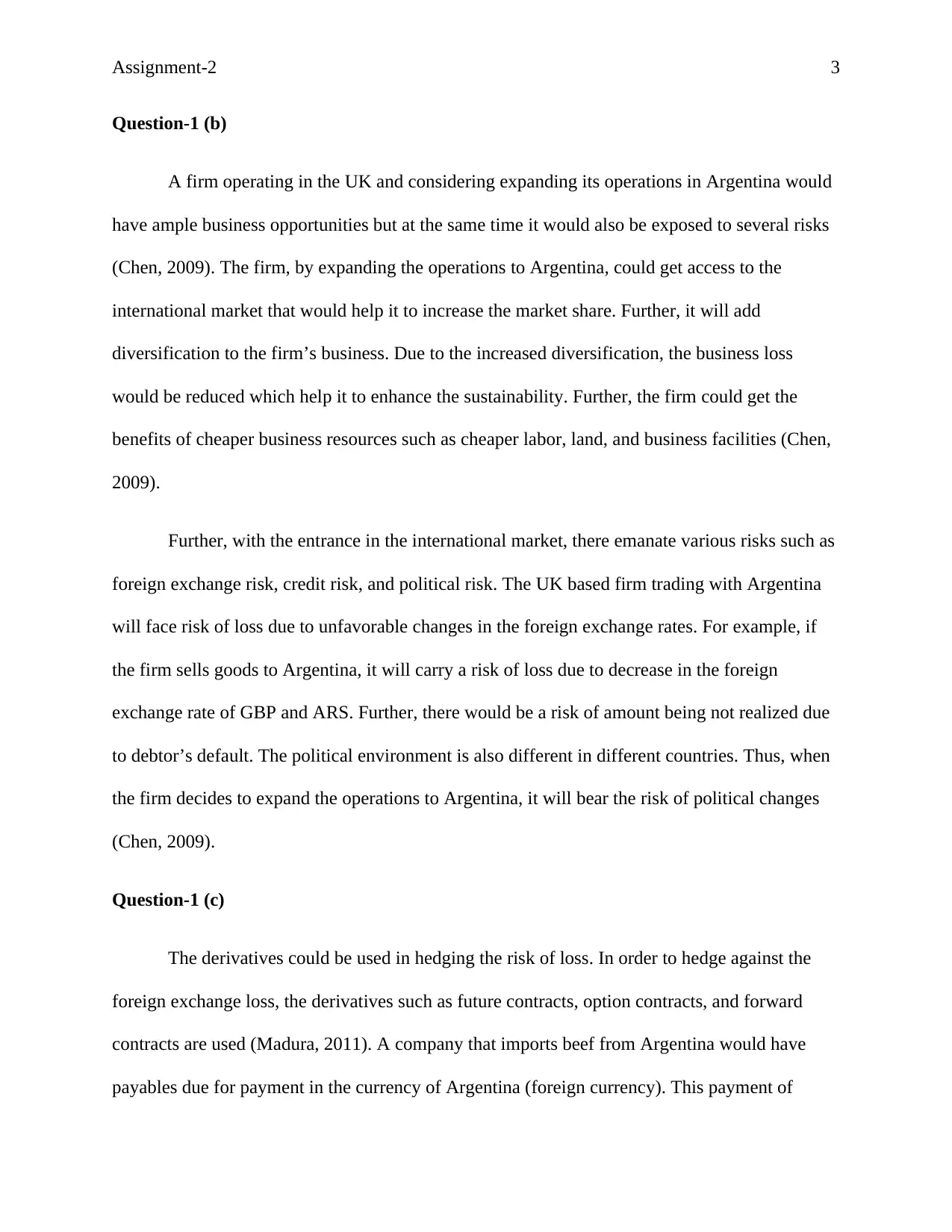
Assignment-2 3
Question-1 (b)
A firm operating in the UK and considering expanding its operations in Argentina would
have ample business opportunities but at the same time it would also be exposed to several risks
(Chen, 2009). The firm, by expanding the operations to Argentina, could get access to the
international market that would help it to increase the market share. Further, it will add
diversification to the firm’s business. Due to the increased diversification, the business loss
would be reduced which help it to enhance the sustainability. Further, the firm could get the
benefits of cheaper business resources such as cheaper labor, land, and business facilities (Chen,
2009).
Further, with the entrance in the international market, there emanate various risks such as
foreign exchange risk, credit risk, and political risk. The UK based firm trading with Argentina
will face risk of loss due to unfavorable changes in the foreign exchange rates. For example, if
the firm sells goods to Argentina, it will carry a risk of loss due to decrease in the foreign
exchange rate of GBP and ARS. Further, there would be a risk of amount being not realized due
to debtor’s default. The political environment is also different in different countries. Thus, when
the firm decides to expand the operations to Argentina, it will bear the risk of political changes
(Chen, 2009).
Question-1 (c)
The derivatives could be used in hedging the risk of loss. In order to hedge against the
foreign exchange loss, the derivatives such as future contracts, option contracts, and forward
contracts are used (Madura, 2011). A company that imports beef from Argentina would have
payables due for payment in the currency of Argentina (foreign currency). This payment of
Question-1 (b)
A firm operating in the UK and considering expanding its operations in Argentina would
have ample business opportunities but at the same time it would also be exposed to several risks
(Chen, 2009). The firm, by expanding the operations to Argentina, could get access to the
international market that would help it to increase the market share. Further, it will add
diversification to the firm’s business. Due to the increased diversification, the business loss
would be reduced which help it to enhance the sustainability. Further, the firm could get the
benefits of cheaper business resources such as cheaper labor, land, and business facilities (Chen,
2009).
Further, with the entrance in the international market, there emanate various risks such as
foreign exchange risk, credit risk, and political risk. The UK based firm trading with Argentina
will face risk of loss due to unfavorable changes in the foreign exchange rates. For example, if
the firm sells goods to Argentina, it will carry a risk of loss due to decrease in the foreign
exchange rate of GBP and ARS. Further, there would be a risk of amount being not realized due
to debtor’s default. The political environment is also different in different countries. Thus, when
the firm decides to expand the operations to Argentina, it will bear the risk of political changes
(Chen, 2009).
Question-1 (c)
The derivatives could be used in hedging the risk of loss. In order to hedge against the
foreign exchange loss, the derivatives such as future contracts, option contracts, and forward
contracts are used (Madura, 2011). A company that imports beef from Argentina would have
payables due for payment in the currency of Argentina (foreign currency). This payment of
⊘ This is a preview!⊘
Do you want full access?
Subscribe today to unlock all pages.

Trusted by 1+ million students worldwide
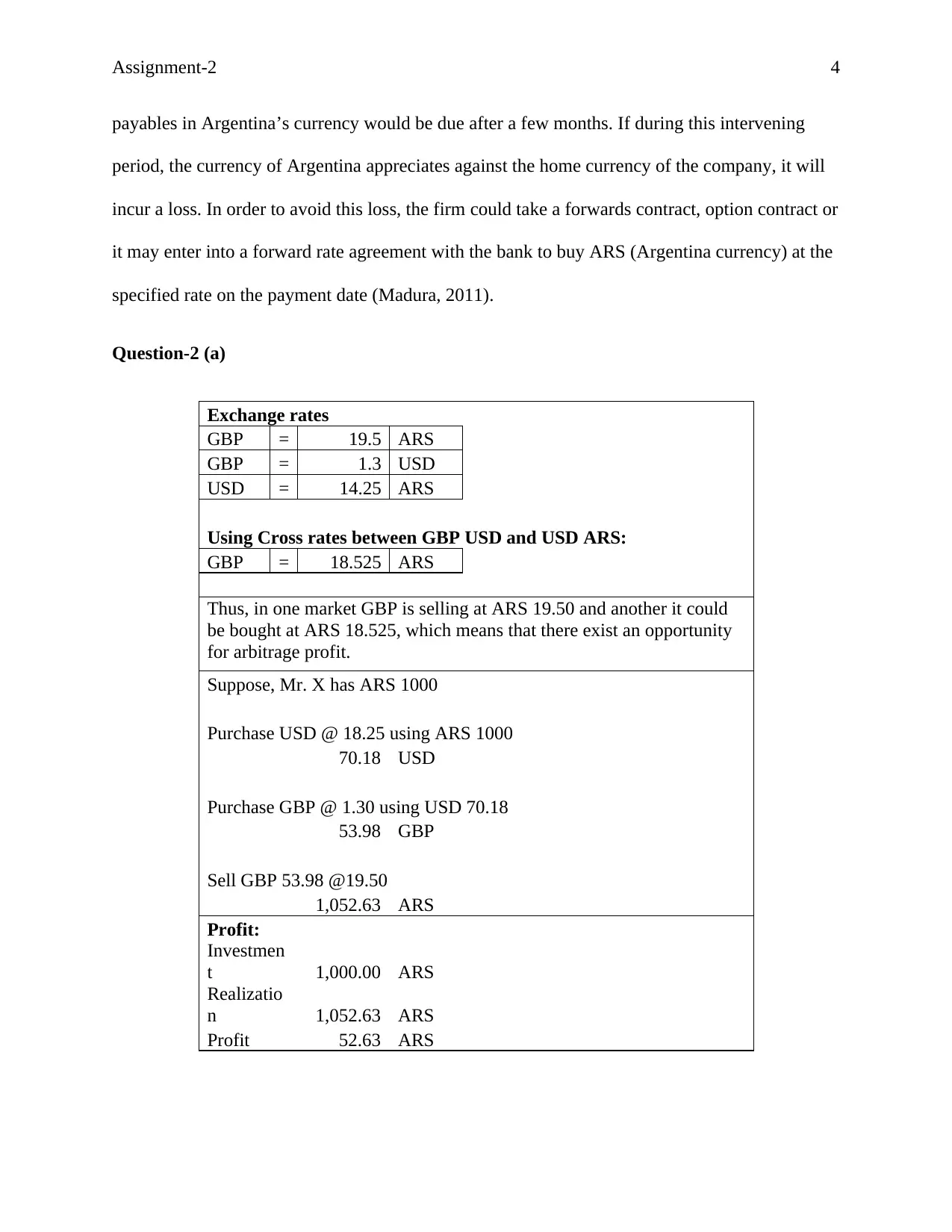
Assignment-2 4
payables in Argentina’s currency would be due after a few months. If during this intervening
period, the currency of Argentina appreciates against the home currency of the company, it will
incur a loss. In order to avoid this loss, the firm could take a forwards contract, option contract or
it may enter into a forward rate agreement with the bank to buy ARS (Argentina currency) at the
specified rate on the payment date (Madura, 2011).
Question-2 (a)
Exchange rates
GBP = 19.5 ARS
GBP = 1.3 USD
USD = 14.25 ARS
Using Cross rates between GBP USD and USD ARS:
GBP = 18.525 ARS
Thus, in one market GBP is selling at ARS 19.50 and another it could
be bought at ARS 18.525, which means that there exist an opportunity
for arbitrage profit.
Suppose, Mr. X has ARS 1000
Purchase USD @ 18.25 using ARS 1000
70.18 USD
Purchase GBP @ 1.30 using USD 70.18
53.98 GBP
Sell GBP 53.98 @19.50
1,052.63 ARS
Profit:
Investmen
t 1,000.00 ARS
Realizatio
n 1,052.63 ARS
Profit 52.63 ARS
payables in Argentina’s currency would be due after a few months. If during this intervening
period, the currency of Argentina appreciates against the home currency of the company, it will
incur a loss. In order to avoid this loss, the firm could take a forwards contract, option contract or
it may enter into a forward rate agreement with the bank to buy ARS (Argentina currency) at the
specified rate on the payment date (Madura, 2011).
Question-2 (a)
Exchange rates
GBP = 19.5 ARS
GBP = 1.3 USD
USD = 14.25 ARS
Using Cross rates between GBP USD and USD ARS:
GBP = 18.525 ARS
Thus, in one market GBP is selling at ARS 19.50 and another it could
be bought at ARS 18.525, which means that there exist an opportunity
for arbitrage profit.
Suppose, Mr. X has ARS 1000
Purchase USD @ 18.25 using ARS 1000
70.18 USD
Purchase GBP @ 1.30 using USD 70.18
53.98 GBP
Sell GBP 53.98 @19.50
1,052.63 ARS
Profit:
Investmen
t 1,000.00 ARS
Realizatio
n 1,052.63 ARS
Profit 52.63 ARS
Paraphrase This Document
Need a fresh take? Get an instant paraphrase of this document with our AI Paraphraser
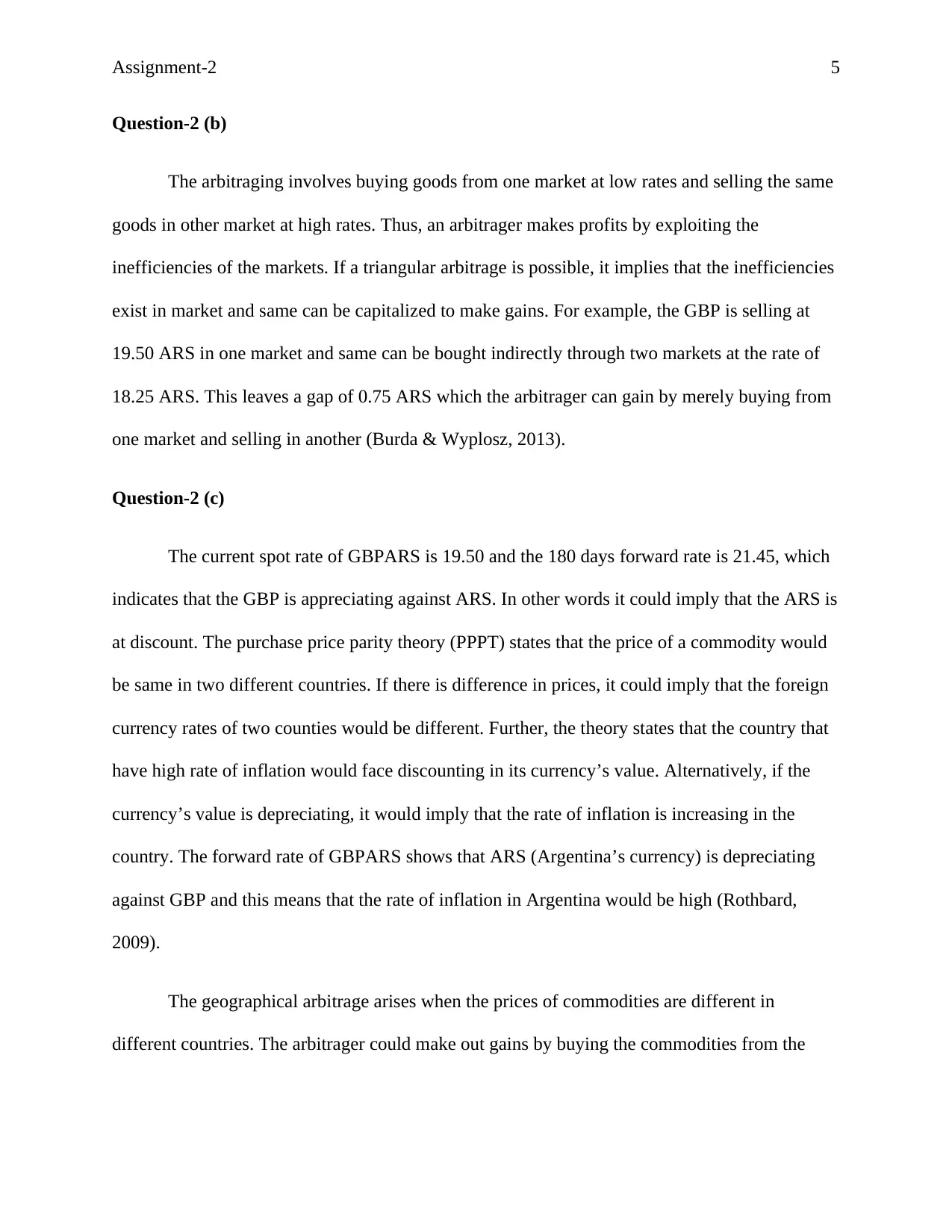
Assignment-2 5
Question-2 (b)
The arbitraging involves buying goods from one market at low rates and selling the same
goods in other market at high rates. Thus, an arbitrager makes profits by exploiting the
inefficiencies of the markets. If a triangular arbitrage is possible, it implies that the inefficiencies
exist in market and same can be capitalized to make gains. For example, the GBP is selling at
19.50 ARS in one market and same can be bought indirectly through two markets at the rate of
18.25 ARS. This leaves a gap of 0.75 ARS which the arbitrager can gain by merely buying from
one market and selling in another (Burda & Wyplosz, 2013).
Question-2 (c)
The current spot rate of GBPARS is 19.50 and the 180 days forward rate is 21.45, which
indicates that the GBP is appreciating against ARS. In other words it could imply that the ARS is
at discount. The purchase price parity theory (PPPT) states that the price of a commodity would
be same in two different countries. If there is difference in prices, it could imply that the foreign
currency rates of two counties would be different. Further, the theory states that the country that
have high rate of inflation would face discounting in its currency’s value. Alternatively, if the
currency’s value is depreciating, it would imply that the rate of inflation is increasing in the
country. The forward rate of GBPARS shows that ARS (Argentina’s currency) is depreciating
against GBP and this means that the rate of inflation in Argentina would be high (Rothbard,
2009).
The geographical arbitrage arises when the prices of commodities are different in
different countries. The arbitrager could make out gains by buying the commodities from the
Question-2 (b)
The arbitraging involves buying goods from one market at low rates and selling the same
goods in other market at high rates. Thus, an arbitrager makes profits by exploiting the
inefficiencies of the markets. If a triangular arbitrage is possible, it implies that the inefficiencies
exist in market and same can be capitalized to make gains. For example, the GBP is selling at
19.50 ARS in one market and same can be bought indirectly through two markets at the rate of
18.25 ARS. This leaves a gap of 0.75 ARS which the arbitrager can gain by merely buying from
one market and selling in another (Burda & Wyplosz, 2013).
Question-2 (c)
The current spot rate of GBPARS is 19.50 and the 180 days forward rate is 21.45, which
indicates that the GBP is appreciating against ARS. In other words it could imply that the ARS is
at discount. The purchase price parity theory (PPPT) states that the price of a commodity would
be same in two different countries. If there is difference in prices, it could imply that the foreign
currency rates of two counties would be different. Further, the theory states that the country that
have high rate of inflation would face discounting in its currency’s value. Alternatively, if the
currency’s value is depreciating, it would imply that the rate of inflation is increasing in the
country. The forward rate of GBPARS shows that ARS (Argentina’s currency) is depreciating
against GBP and this means that the rate of inflation in Argentina would be high (Rothbard,
2009).
The geographical arbitrage arises when the prices of commodities are different in
different countries. The arbitrager could make out gains by buying the commodities from the
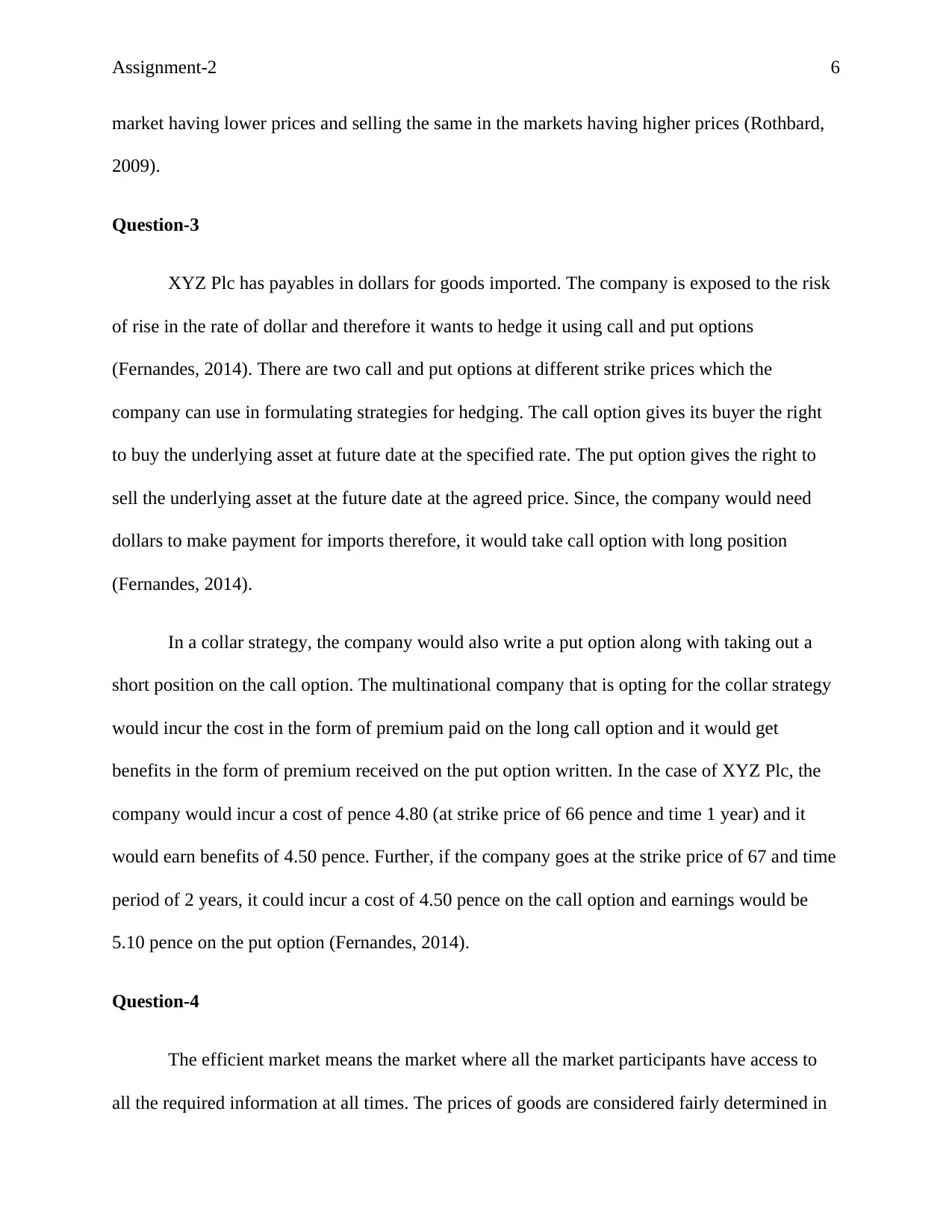
Assignment-2 6
market having lower prices and selling the same in the markets having higher prices (Rothbard,
2009).
Question-3
XYZ Plc has payables in dollars for goods imported. The company is exposed to the risk
of rise in the rate of dollar and therefore it wants to hedge it using call and put options
(Fernandes, 2014). There are two call and put options at different strike prices which the
company can use in formulating strategies for hedging. The call option gives its buyer the right
to buy the underlying asset at future date at the specified rate. The put option gives the right to
sell the underlying asset at the future date at the agreed price. Since, the company would need
dollars to make payment for imports therefore, it would take call option with long position
(Fernandes, 2014).
In a collar strategy, the company would also write a put option along with taking out a
short position on the call option. The multinational company that is opting for the collar strategy
would incur the cost in the form of premium paid on the long call option and it would get
benefits in the form of premium received on the put option written. In the case of XYZ Plc, the
company would incur a cost of pence 4.80 (at strike price of 66 pence and time 1 year) and it
would earn benefits of 4.50 pence. Further, if the company goes at the strike price of 67 and time
period of 2 years, it could incur a cost of 4.50 pence on the call option and earnings would be
5.10 pence on the put option (Fernandes, 2014).
Question-4
The efficient market means the market where all the market participants have access to
all the required information at all times. The prices of goods are considered fairly determined in
market having lower prices and selling the same in the markets having higher prices (Rothbard,
2009).
Question-3
XYZ Plc has payables in dollars for goods imported. The company is exposed to the risk
of rise in the rate of dollar and therefore it wants to hedge it using call and put options
(Fernandes, 2014). There are two call and put options at different strike prices which the
company can use in formulating strategies for hedging. The call option gives its buyer the right
to buy the underlying asset at future date at the specified rate. The put option gives the right to
sell the underlying asset at the future date at the agreed price. Since, the company would need
dollars to make payment for imports therefore, it would take call option with long position
(Fernandes, 2014).
In a collar strategy, the company would also write a put option along with taking out a
short position on the call option. The multinational company that is opting for the collar strategy
would incur the cost in the form of premium paid on the long call option and it would get
benefits in the form of premium received on the put option written. In the case of XYZ Plc, the
company would incur a cost of pence 4.80 (at strike price of 66 pence and time 1 year) and it
would earn benefits of 4.50 pence. Further, if the company goes at the strike price of 67 and time
period of 2 years, it could incur a cost of 4.50 pence on the call option and earnings would be
5.10 pence on the put option (Fernandes, 2014).
Question-4
The efficient market means the market where all the market participants have access to
all the required information at all times. The prices of goods are considered fairly determined in
⊘ This is a preview!⊘
Do you want full access?
Subscribe today to unlock all pages.

Trusted by 1+ million students worldwide
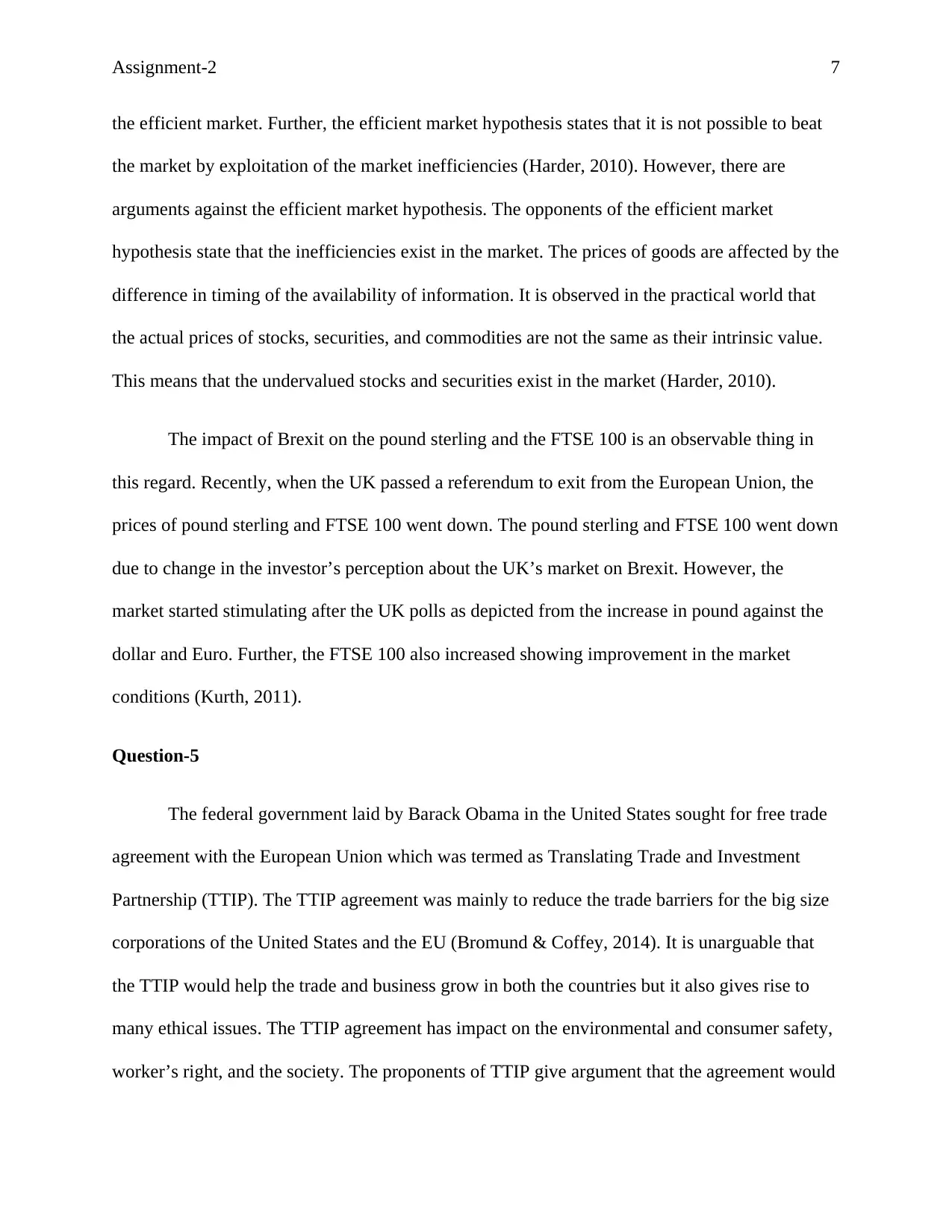
Assignment-2 7
the efficient market. Further, the efficient market hypothesis states that it is not possible to beat
the market by exploitation of the market inefficiencies (Harder, 2010). However, there are
arguments against the efficient market hypothesis. The opponents of the efficient market
hypothesis state that the inefficiencies exist in the market. The prices of goods are affected by the
difference in timing of the availability of information. It is observed in the practical world that
the actual prices of stocks, securities, and commodities are not the same as their intrinsic value.
This means that the undervalued stocks and securities exist in the market (Harder, 2010).
The impact of Brexit on the pound sterling and the FTSE 100 is an observable thing in
this regard. Recently, when the UK passed a referendum to exit from the European Union, the
prices of pound sterling and FTSE 100 went down. The pound sterling and FTSE 100 went down
due to change in the investor’s perception about the UK’s market on Brexit. However, the
market started stimulating after the UK polls as depicted from the increase in pound against the
dollar and Euro. Further, the FTSE 100 also increased showing improvement in the market
conditions (Kurth, 2011).
Question-5
The federal government laid by Barack Obama in the United States sought for free trade
agreement with the European Union which was termed as Translating Trade and Investment
Partnership (TTIP). The TTIP agreement was mainly to reduce the trade barriers for the big size
corporations of the United States and the EU (Bromund & Coffey, 2014). It is unarguable that
the TTIP would help the trade and business grow in both the countries but it also gives rise to
many ethical issues. The TTIP agreement has impact on the environmental and consumer safety,
worker’s right, and the society. The proponents of TTIP give argument that the agreement would
the efficient market. Further, the efficient market hypothesis states that it is not possible to beat
the market by exploitation of the market inefficiencies (Harder, 2010). However, there are
arguments against the efficient market hypothesis. The opponents of the efficient market
hypothesis state that the inefficiencies exist in the market. The prices of goods are affected by the
difference in timing of the availability of information. It is observed in the practical world that
the actual prices of stocks, securities, and commodities are not the same as their intrinsic value.
This means that the undervalued stocks and securities exist in the market (Harder, 2010).
The impact of Brexit on the pound sterling and the FTSE 100 is an observable thing in
this regard. Recently, when the UK passed a referendum to exit from the European Union, the
prices of pound sterling and FTSE 100 went down. The pound sterling and FTSE 100 went down
due to change in the investor’s perception about the UK’s market on Brexit. However, the
market started stimulating after the UK polls as depicted from the increase in pound against the
dollar and Euro. Further, the FTSE 100 also increased showing improvement in the market
conditions (Kurth, 2011).
Question-5
The federal government laid by Barack Obama in the United States sought for free trade
agreement with the European Union which was termed as Translating Trade and Investment
Partnership (TTIP). The TTIP agreement was mainly to reduce the trade barriers for the big size
corporations of the United States and the EU (Bromund & Coffey, 2014). It is unarguable that
the TTIP would help the trade and business grow in both the countries but it also gives rise to
many ethical issues. The TTIP agreement has impact on the environmental and consumer safety,
worker’s right, and the society. The proponents of TTIP give argument that the agreement would
Paraphrase This Document
Need a fresh take? Get an instant paraphrase of this document with our AI Paraphraser
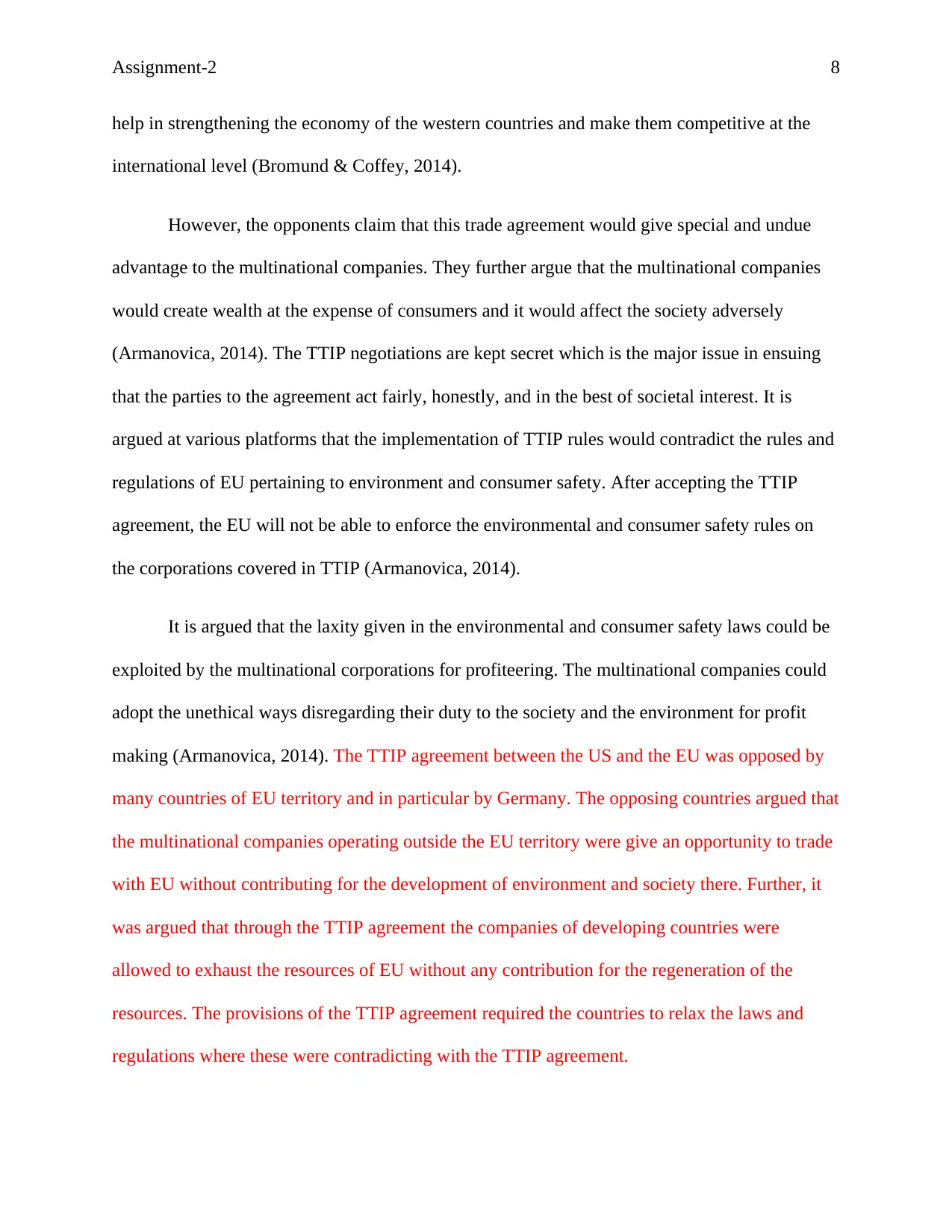
Assignment-2 8
help in strengthening the economy of the western countries and make them competitive at the
international level (Bromund & Coffey, 2014).
However, the opponents claim that this trade agreement would give special and undue
advantage to the multinational companies. They further argue that the multinational companies
would create wealth at the expense of consumers and it would affect the society adversely
(Armanovica, 2014). The TTIP negotiations are kept secret which is the major issue in ensuing
that the parties to the agreement act fairly, honestly, and in the best of societal interest. It is
argued at various platforms that the implementation of TTIP rules would contradict the rules and
regulations of EU pertaining to environment and consumer safety. After accepting the TTIP
agreement, the EU will not be able to enforce the environmental and consumer safety rules on
the corporations covered in TTIP (Armanovica, 2014).
It is argued that the laxity given in the environmental and consumer safety laws could be
exploited by the multinational corporations for profiteering. The multinational companies could
adopt the unethical ways disregarding their duty to the society and the environment for profit
making (Armanovica, 2014). The TTIP agreement between the US and the EU was opposed by
many countries of EU territory and in particular by Germany. The opposing countries argued that
the multinational companies operating outside the EU territory were give an opportunity to trade
with EU without contributing for the development of environment and society there. Further, it
was argued that through the TTIP agreement the companies of developing countries were
allowed to exhaust the resources of EU without any contribution for the regeneration of the
resources. The provisions of the TTIP agreement required the countries to relax the laws and
regulations where these were contradicting with the TTIP agreement.
help in strengthening the economy of the western countries and make them competitive at the
international level (Bromund & Coffey, 2014).
However, the opponents claim that this trade agreement would give special and undue
advantage to the multinational companies. They further argue that the multinational companies
would create wealth at the expense of consumers and it would affect the society adversely
(Armanovica, 2014). The TTIP negotiations are kept secret which is the major issue in ensuing
that the parties to the agreement act fairly, honestly, and in the best of societal interest. It is
argued at various platforms that the implementation of TTIP rules would contradict the rules and
regulations of EU pertaining to environment and consumer safety. After accepting the TTIP
agreement, the EU will not be able to enforce the environmental and consumer safety rules on
the corporations covered in TTIP (Armanovica, 2014).
It is argued that the laxity given in the environmental and consumer safety laws could be
exploited by the multinational corporations for profiteering. The multinational companies could
adopt the unethical ways disregarding their duty to the society and the environment for profit
making (Armanovica, 2014). The TTIP agreement between the US and the EU was opposed by
many countries of EU territory and in particular by Germany. The opposing countries argued that
the multinational companies operating outside the EU territory were give an opportunity to trade
with EU without contributing for the development of environment and society there. Further, it
was argued that through the TTIP agreement the companies of developing countries were
allowed to exhaust the resources of EU without any contribution for the regeneration of the
resources. The provisions of the TTIP agreement required the countries to relax the laws and
regulations where these were contradicting with the TTIP agreement.
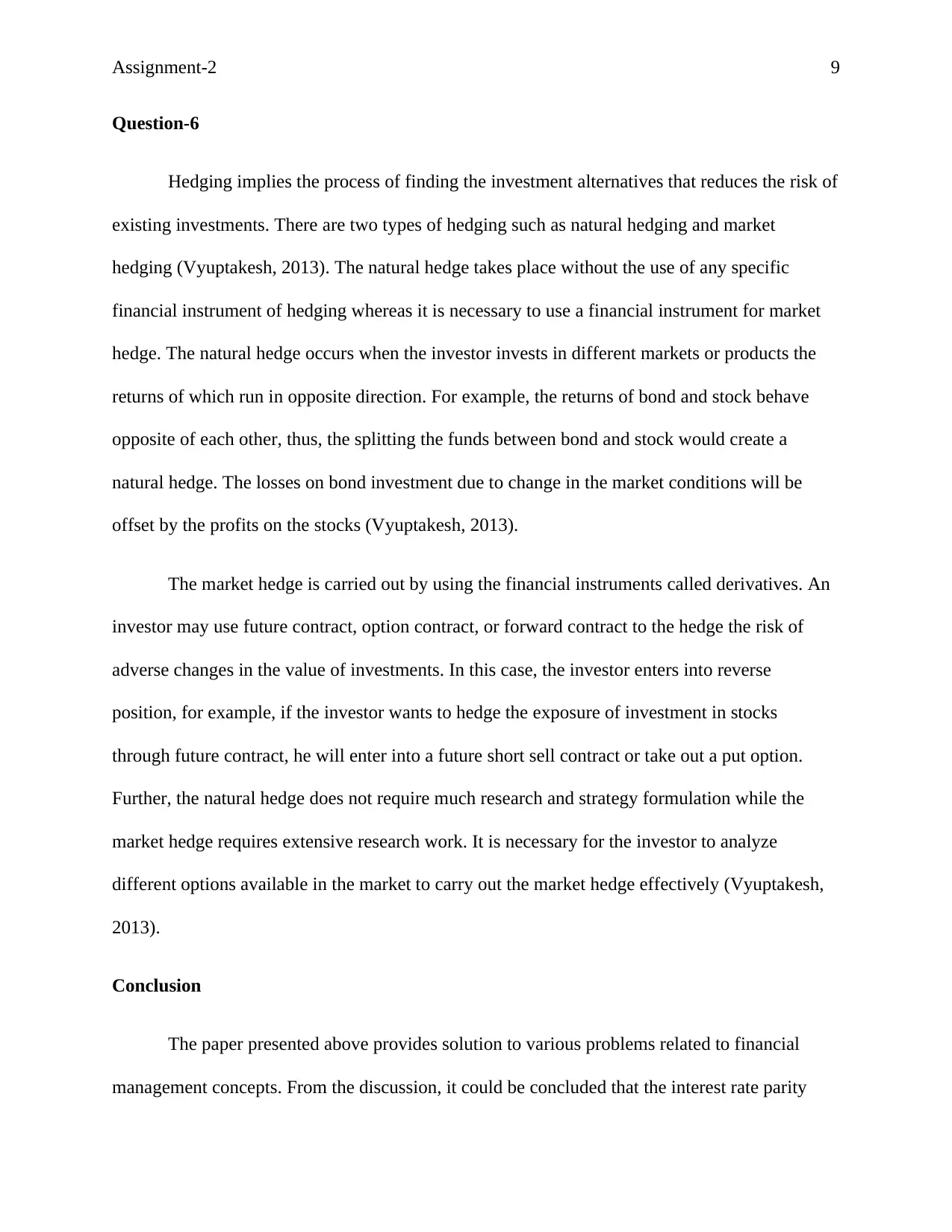
Assignment-2 9
Question-6
Hedging implies the process of finding the investment alternatives that reduces the risk of
existing investments. There are two types of hedging such as natural hedging and market
hedging (Vyuptakesh, 2013). The natural hedge takes place without the use of any specific
financial instrument of hedging whereas it is necessary to use a financial instrument for market
hedge. The natural hedge occurs when the investor invests in different markets or products the
returns of which run in opposite direction. For example, the returns of bond and stock behave
opposite of each other, thus, the splitting the funds between bond and stock would create a
natural hedge. The losses on bond investment due to change in the market conditions will be
offset by the profits on the stocks (Vyuptakesh, 2013).
The market hedge is carried out by using the financial instruments called derivatives. An
investor may use future contract, option contract, or forward contract to the hedge the risk of
adverse changes in the value of investments. In this case, the investor enters into reverse
position, for example, if the investor wants to hedge the exposure of investment in stocks
through future contract, he will enter into a future short sell contract or take out a put option.
Further, the natural hedge does not require much research and strategy formulation while the
market hedge requires extensive research work. It is necessary for the investor to analyze
different options available in the market to carry out the market hedge effectively (Vyuptakesh,
2013).
Conclusion
The paper presented above provides solution to various problems related to financial
management concepts. From the discussion, it could be concluded that the interest rate parity
Question-6
Hedging implies the process of finding the investment alternatives that reduces the risk of
existing investments. There are two types of hedging such as natural hedging and market
hedging (Vyuptakesh, 2013). The natural hedge takes place without the use of any specific
financial instrument of hedging whereas it is necessary to use a financial instrument for market
hedge. The natural hedge occurs when the investor invests in different markets or products the
returns of which run in opposite direction. For example, the returns of bond and stock behave
opposite of each other, thus, the splitting the funds between bond and stock would create a
natural hedge. The losses on bond investment due to change in the market conditions will be
offset by the profits on the stocks (Vyuptakesh, 2013).
The market hedge is carried out by using the financial instruments called derivatives. An
investor may use future contract, option contract, or forward contract to the hedge the risk of
adverse changes in the value of investments. In this case, the investor enters into reverse
position, for example, if the investor wants to hedge the exposure of investment in stocks
through future contract, he will enter into a future short sell contract or take out a put option.
Further, the natural hedge does not require much research and strategy formulation while the
market hedge requires extensive research work. It is necessary for the investor to analyze
different options available in the market to carry out the market hedge effectively (Vyuptakesh,
2013).
Conclusion
The paper presented above provides solution to various problems related to financial
management concepts. From the discussion, it could be concluded that the interest rate parity
⊘ This is a preview!⊘
Do you want full access?
Subscribe today to unlock all pages.

Trusted by 1+ million students worldwide
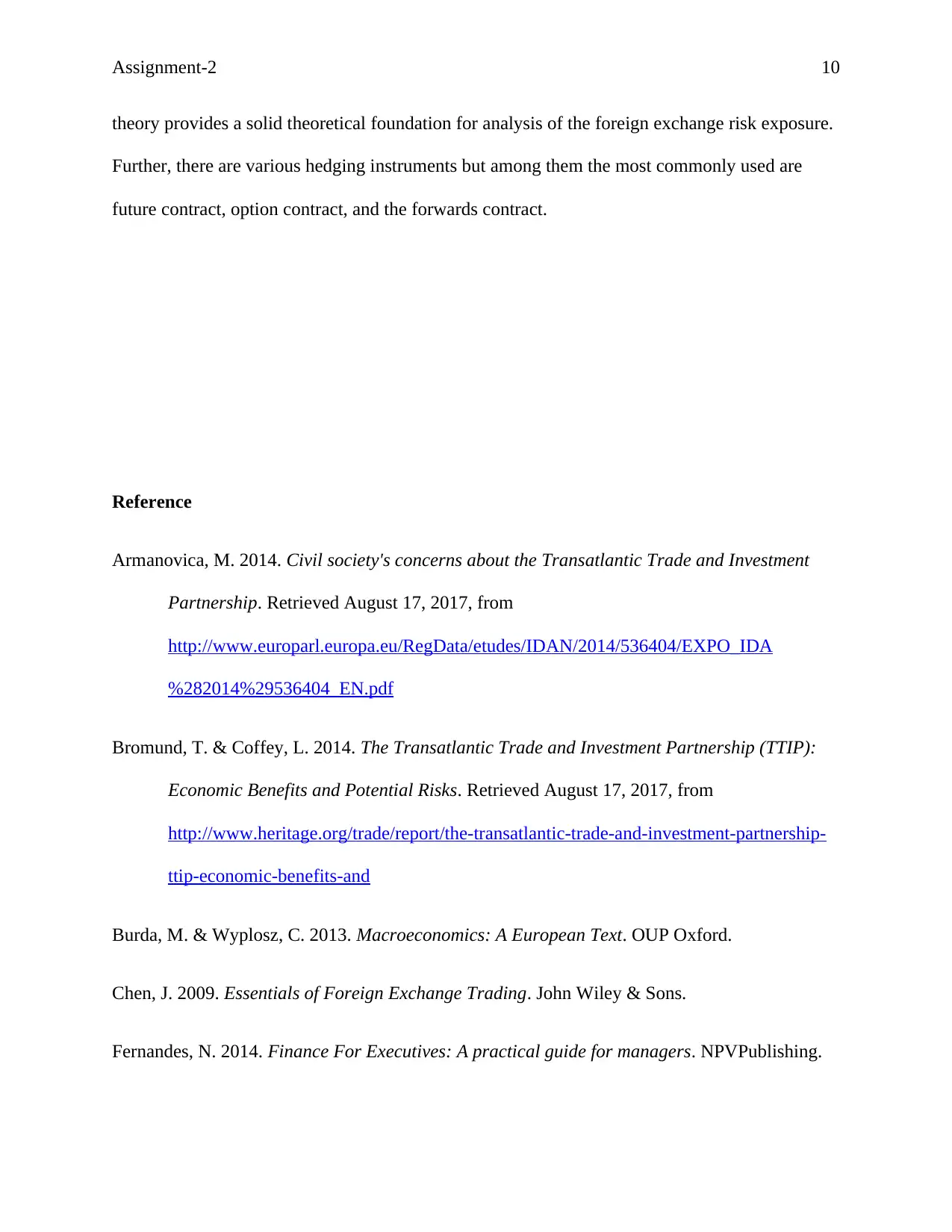
Assignment-2 10
theory provides a solid theoretical foundation for analysis of the foreign exchange risk exposure.
Further, there are various hedging instruments but among them the most commonly used are
future contract, option contract, and the forwards contract.
Reference
Armanovica, M. 2014. Civil society's concerns about the Transatlantic Trade and Investment
Partnership. Retrieved August 17, 2017, from
http://www.europarl.europa.eu/RegData/etudes/IDAN/2014/536404/EXPO_IDA
%282014%29536404_EN.pdf
Bromund, T. & Coffey, L. 2014. The Transatlantic Trade and Investment Partnership (TTIP):
Economic Benefits and Potential Risks. Retrieved August 17, 2017, from
http://www.heritage.org/trade/report/the-transatlantic-trade-and-investment-partnership-
ttip-economic-benefits-and
Burda, M. & Wyplosz, C. 2013. Macroeconomics: A European Text. OUP Oxford.
Chen, J. 2009. Essentials of Foreign Exchange Trading. John Wiley & Sons.
Fernandes, N. 2014. Finance For Executives: A practical guide for managers. NPVPublishing.
theory provides a solid theoretical foundation for analysis of the foreign exchange risk exposure.
Further, there are various hedging instruments but among them the most commonly used are
future contract, option contract, and the forwards contract.
Reference
Armanovica, M. 2014. Civil society's concerns about the Transatlantic Trade and Investment
Partnership. Retrieved August 17, 2017, from
http://www.europarl.europa.eu/RegData/etudes/IDAN/2014/536404/EXPO_IDA
%282014%29536404_EN.pdf
Bromund, T. & Coffey, L. 2014. The Transatlantic Trade and Investment Partnership (TTIP):
Economic Benefits and Potential Risks. Retrieved August 17, 2017, from
http://www.heritage.org/trade/report/the-transatlantic-trade-and-investment-partnership-
ttip-economic-benefits-and
Burda, M. & Wyplosz, C. 2013. Macroeconomics: A European Text. OUP Oxford.
Chen, J. 2009. Essentials of Foreign Exchange Trading. John Wiley & Sons.
Fernandes, N. 2014. Finance For Executives: A practical guide for managers. NPVPublishing.
Paraphrase This Document
Need a fresh take? Get an instant paraphrase of this document with our AI Paraphraser
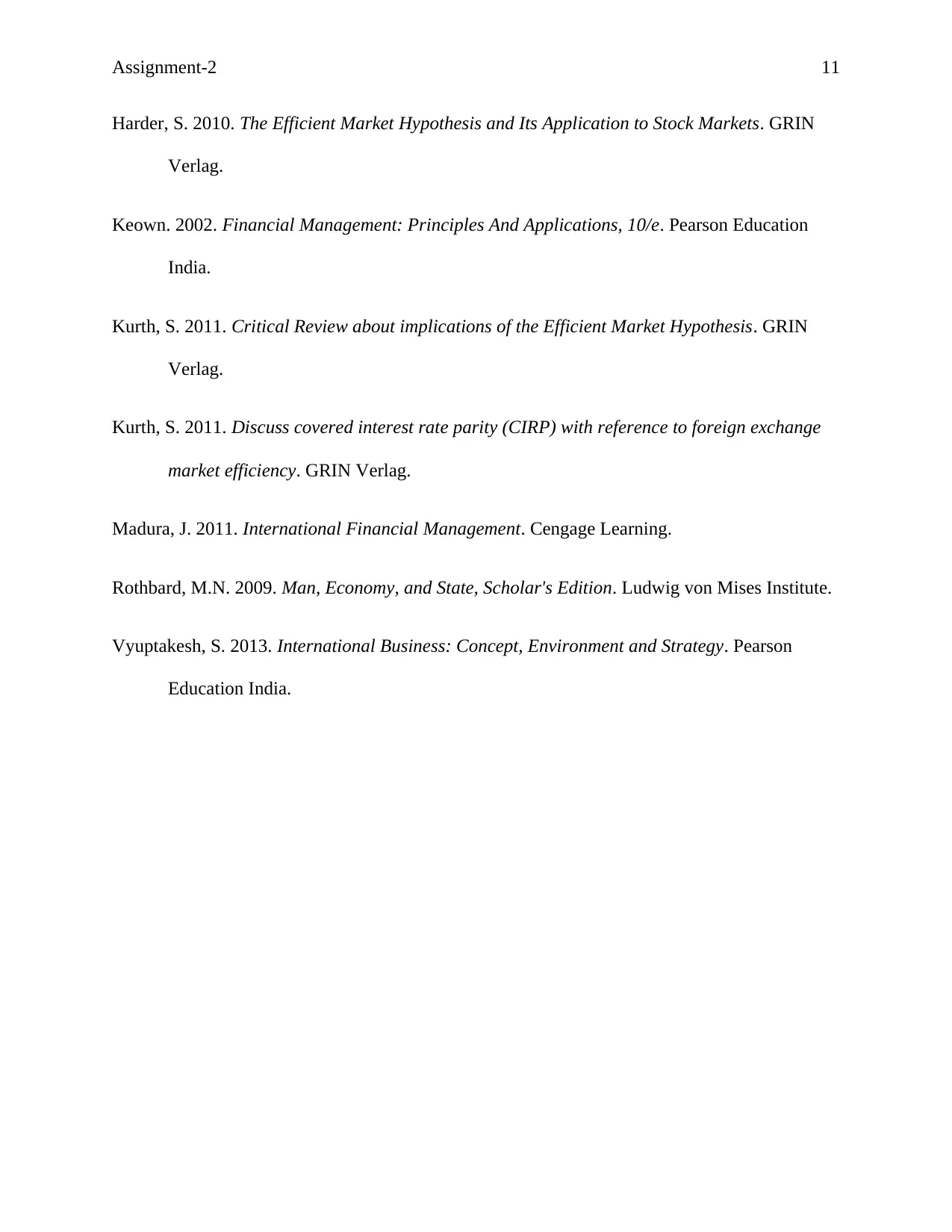
Assignment-2 11
Harder, S. 2010. The Efficient Market Hypothesis and Its Application to Stock Markets. GRIN
Verlag.
Keown. 2002. Financial Management: Principles And Applications, 10/e. Pearson Education
India.
Kurth, S. 2011. Critical Review about implications of the Efficient Market Hypothesis. GRIN
Verlag.
Kurth, S. 2011. Discuss covered interest rate parity (CIRP) with reference to foreign exchange
market efficiency. GRIN Verlag.
Madura, J. 2011. International Financial Management. Cengage Learning.
Rothbard, M.N. 2009. Man, Economy, and State, Scholar's Edition. Ludwig von Mises Institute.
Vyuptakesh, S. 2013. International Business: Concept, Environment and Strategy. Pearson
Education India.
Harder, S. 2010. The Efficient Market Hypothesis and Its Application to Stock Markets. GRIN
Verlag.
Keown. 2002. Financial Management: Principles And Applications, 10/e. Pearson Education
India.
Kurth, S. 2011. Critical Review about implications of the Efficient Market Hypothesis. GRIN
Verlag.
Kurth, S. 2011. Discuss covered interest rate parity (CIRP) with reference to foreign exchange
market efficiency. GRIN Verlag.
Madura, J. 2011. International Financial Management. Cengage Learning.
Rothbard, M.N. 2009. Man, Economy, and State, Scholar's Edition. Ludwig von Mises Institute.
Vyuptakesh, S. 2013. International Business: Concept, Environment and Strategy. Pearson
Education India.
1 out of 11
Related Documents
Your All-in-One AI-Powered Toolkit for Academic Success.
+13062052269
info@desklib.com
Available 24*7 on WhatsApp / Email
![[object Object]](/_next/static/media/star-bottom.7253800d.svg)
Unlock your academic potential
Copyright © 2020–2026 A2Z Services. All Rights Reserved. Developed and managed by ZUCOL.




